Related Research Articles
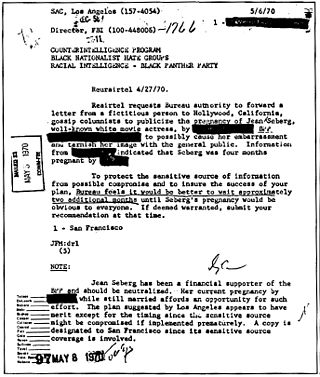
COINTELPRO was a series of covert and illegal projects conducted between 1956 and 1971 by the United States Federal Bureau of Investigation (FBI) aimed at surveilling, infiltrating, discrediting, and disrupting American political organizations that the FBI perceived as subversive. Groups and individuals targeted by the FBI included feminist organizations, the Communist Party USA, anti-Vietnam War organizers, activists in the civil rights and Black power movements, environmentalist and animal rights organizations, the American Indian Movement (AIM), Chicano and Mexican-American groups like the Brown Berets and the United Farm Workers, and independence movements. Although the program primarily focused on organizations that were part of the broader New Left, they also targeted white supremacist groups such as the Ku Klux Klan and the National States' Rights Party.

The Federal Bureau of Investigation (FBI) is the domestic intelligence and security service of the United States and its principal federal law enforcement agency. An agency of the United States Department of Justice, the FBI is a member of the U.S. Intelligence Community and reports to both the Attorney General and the Director of National Intelligence. A leading U.S. counterterrorism, counterintelligence, and criminal investigative organization, the FBI has jurisdiction over violations of more than 200 categories of federal crimes.
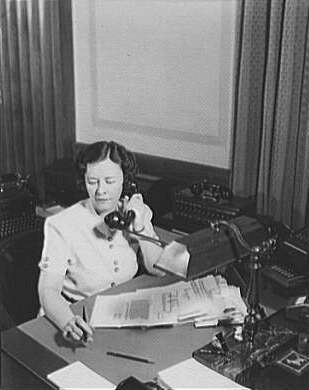
Helen Wilburforce Gandy was the American longtime secretary to Federal Bureau of Investigation director J. Edgar Hoover, who called her "indispensable". Serving in that role for 54 years she exercised great behind-the-scenes influence on Hoover and the operations of the Bureau. Following Hoover's death in 1972, she spent weeks destroying his "Personal File," thought to contain the most incriminating material Hoover used to manipulate or blackmail the most powerful figures in Washington.

John Edgar Hoover was an American attorney and law enforcement administrator who served as the fifth and final Director of the Bureau of Investigation (BOI) and the first Director of the Federal Bureau of Investigation (FBI). President Calvin Coolidge first appointed Hoover as director of the BOI, the predecessor to the FBI, in 1924. After 11 years in the post, Hoover became instrumental in founding the FBI in June 1935, where he remained as director for an additional 37 years until his death in May 1972 – serving a total of 48 years leading both the BOI and the FBI under eight Presidents.
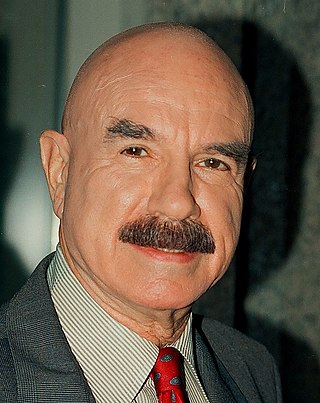
George Gordon Battle Liddy was an American lawyer and FBI agent who was convicted of conspiracy, burglary, and illegal wiretapping for his role in the Watergate scandal during the Nixon administration.
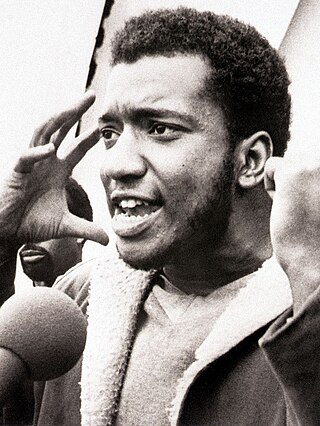
Fredrick Allen Hampton Sr. was an American Marxist-Leninist revolutionary. He came to prominence in his late teens and early 20s in Chicago as deputy chairman of the national Black Panther Party and chair of the Illinois chapter. As a progressive African American, he founded the anti-racist, anti-classist Rainbow Coalition, a prominent multicultural political organization that initially included the Black Panthers, Young Patriots, and the Young Lords, and an alliance among major Chicago street gangs to help them end infighting and work for social change. Hampton considered fascism the greatest threat, saying "nothing is more important than stopping fascism, because fascism will stop us all."

Deep Throat is the pseudonym given to the secret informant who provided information in 1972 to Bob Woodward, who shared it with Carl Bernstein. Woodward and Bernstein were reporters for The Washington Post, and Deep Throat provided key details about the involvement of U.S. president Richard Nixon's administration in what came to be known as the Watergate scandal. In 2005, 31 years after Nixon's resignation and 11 years after Nixon's death, a family attorney stated that former Federal Bureau of Investigation (FBI) Associate Director Mark Felt was Deep Throat. By then, Felt was suffering from dementia and had previously denied being Deep Throat, but Woodward and Bernstein then confirmed the attorney's claim.
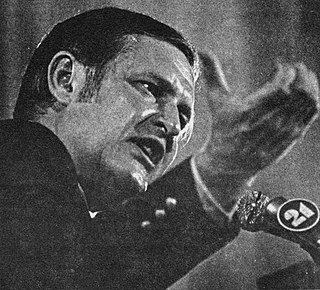
Jack Northman Anderson was an American newspaper columnist, syndicated by United Features Syndicate, considered one of the founders of modern investigative journalism. Anderson won the 1972 Pulitzer Prize for National Reporting for his investigation on secret U.S. policy decision-making between the United States and Pakistan during the Indo-Pakistani War of 1971. In addition to his newspaper career, Anderson also had a national radio show on the Mutual Broadcasting System, acted as Washington bureau chief of Parade magazine, and was a commentator on ABC-TV's Good Morning America for nine years.

William Mark Felt Sr. was an American law enforcement officer who worked for the Federal Bureau of Investigation (FBI) from 1942 to 1973 and was known for his role in the Watergate scandal. Felt was an FBI special agent who eventually rose to the position of Deputy Director, the Bureau's second-highest-ranking post. Felt worked in several FBI field offices prior to his promotion to the Bureau's headquarters. In 1980, he was convicted of having violated the civil rights of people thought to be associated with members of the Weather Underground, by ordering FBI agents to break into their homes and search the premises as part of an attempt to prevent bombings. He was ordered to pay a fine, but was pardoned by President Ronald Reagan during his appeal.

William Cornelius Sullivan was an assistant director of the Federal Bureau of Investigation who was in charge of the agency's domestic intelligence operations from 1961 to 1971. Sullivan was forced out of the FBI at the end of September 1971 due to disagreements with FBI director J. Edgar Hoover. The following year, Sullivan was appointed as the head of the Justice Department's new Office of National Narcotics Intelligence, which he led from June 1972 to July 1973. Sullivan died in a hunting accident in 1977. His memoir of his thirty-year career in the FBI, written with journalist Bill Brown, was published posthumously by commercial publisher W. W. Norton & Company in 1979.
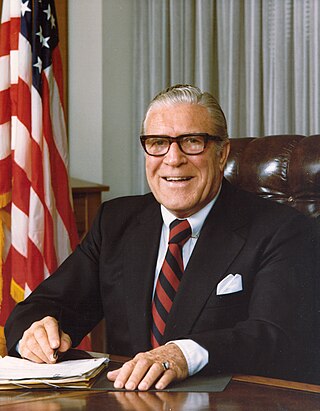
Clarence Marion Kelley was an American law enforcement officer. He served as the Chief of the Kansas City Police Department in Kansas City, Missouri, from 1961 to 1973, and as the second director of the Federal Bureau of Investigation from 1973 to 1978.

The Citizens' Commission to Investigate the FBI was an activist group operational in the US during the early 1970s. Their only known action was breaking into a two-man Media, Pennsylvania, office of the Federal Bureau of Investigation (FBI) and stealing over 1,000 classified documents. They then mailed these documents anonymously to several US newspapers to expose numerous illegal FBI operations which were infringing on the First Amendment rights of American citizens. Most news outlets initially refused to publish the information, saying it related to ongoing operations and that disclosure might have threatened the lives of agents or informants. However, The Washington Post, after affirming the veracity of the files which the Commission sent them, ran a front-page story on March 24, 1971, at which point other media organizations followed suit.
Athan George Theoharis was an American historian, professor of history at Marquette University in Milwaukee, Wisconsin. As well as his extensive teaching career, he was noteworthy as an expert on the Federal Bureau of Investigation (FBI), J. Edgar Hoover, and U.S. intelligence agencies, having written and edited many books on these and related subjects.
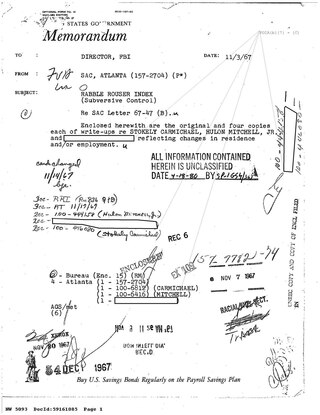
The FBI Indexes, or Index List, was a system used to track American citizens and other people by the Federal Bureau of Investigation (FBI) before the adoption of computerized databases. The Index List was originally made of paper index cards, first compiled by J. Edgar Hoover at the Bureau of Investigations before he was appointed director of the FBI. The Index List was used to track U.S. citizens and others believed by the FBI to be dangerous to national security, and was subdivided into various divisions which generally were rated based on different classes of danger the subject was thought to represent.
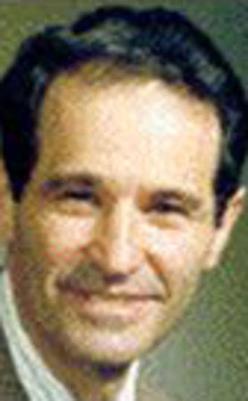
William Cooper Davidon was an American professor of physics and mathematics, and a peace activist. As the mastermind of the March 8, 1971, FBI office break-in, in Media, Pennsylvania, Davidon was the informal leader of the Citizens' Commission to Investigate the FBI. The Media break-in resulted in the disclosure of COINTELPRO, which in turn led to subsequent investigations and reforms of the FBI.
John Curtis Raines was an American professor, activist, and whistleblower. He was a member of the Citizens' Commission to Investigate the FBI, which stole documents from an FBI office and exposed illegal activity and abuses of power, including COINTELPRO.

1971 is a 2014 American documentary film and the directorial debut of producer Johanna Hamilton, who also co-wrote the film. The film had its world premiere on 18 April 2014 at the Tribeca Film Festival and focuses on the break-in of an FBI office in Media, Pennsylvania on Monday, March 8, 1971, to steal over 1000 classified documents. It was pitched at the Sheffield Doc/Fest 2011 MeetMarket preceding its debut. The break-in took place on the night of the first Ali-Frazier boxing title fight dubbed the Fight of the Century.

The FBI–King suicide letter or blackmail package was an anonymous 1964 letter and package by the Federal Bureau of Investigation (FBI) which was allegedly meant to blackmail Dr. Martin Luther King Jr. into committing suicide.
Joyce Haber was an American gossip columnist who worked for the Los Angeles Times.
Ernie Lazar was an American researcher and a prolific Freedom of Information Act petitioner who amassed a "vast digital and documentary archive of government records on political extremists," used by many scholars, who regarded him as a "hero of researchers."
References
- ↑ "Betty Medsger". Investigating Power. Retrieved 8 November 2018.
- ↑ Garrow, David (2014-01-23). "Review: 'The Burglary: The Discovery of J. Edgar Hoover's Secret FBI' by Betty Medsger". Washington Post. Retrieved 9 November 2018.
- ↑ Shaffer, Robert (2015-10-23). "BettyMedsger. The Burglary: The Discovery of J. Edgar Hoover's Secret FBI. New York: Alfred A. Knopf, 2014". Peace & Change. 40 (4): 572–575. doi:10.1111/pech.12155.
- ↑ Oshinsky, David (2014-01-31). "Breaking In". New York Times. Retrieved 8 November 2018.
- ↑ Johnson, Carrie. "The Secret Burglary That Exposed J. Edgar Hoover's FBI". NPR. Retrieved 9 November 2018.
- ↑ Oppenheimer, Martin (2014). "How We Found Out About COINTELPRO". Monthly Review. 66 (4): 54–60. doi:10.14452/MR-066-04-2014-08_7.
- ↑ Gaffni, Matthias (7 March 2021). "'Something had to be done'". San Francisco Chronicle. Retrieved 31 July 2021.
- ↑ "Journalism Professor Emerita Betty Medsger Broke Story of 1971 Break-In to FBI Office". San Francisco State University. Retrieved 31 July 2021.